Module 9, “Business model”, assesses the companies’ dependency on emission-intensive revenue streams and steps being taken to transition and/or replace its existing business model(s) to remain profitable in a low-carbon economy. The company’s future business model(s) should enable it to decouple financial results from GHG emissions, in order to meet the constraints of a low-carbon transition while continuing to generate value. This can be done by developing new, low-carbon business models outside the core business of the company, while decarbonizing or terminating existing, high-carbon business models. This should lead to the company’s revenue being generated entirely from low-carbon products and services, according to the ACT definition of “low carbon” for a particular sector.
This module aims to identify both:
-
the “big picture” view of the company’s low-carbon transition, by assessing its overall share of revenue from low-carbon products and services and the trend in share over time;
-
the detail of the specific changes it is making to its business: introducing/expanding new, low-carbon business models; and decarbonizing/terminating its existing, high-carbon business models.
